Page
1 | Page 2 | Page 3
Jacob
Klassen was one of those who was frozen at his job. He worked for
a coal company before his call for military service and, after he
claimed CO status, he continued working at reduced wages.
“In
fall 1944 he was transferred to the grain terminals at Port Arthur
, ON, where ships were loaded with grain for export…. Jake worked
shifts, cleaning grain at the pool terminal which included 160
round storage bins, with additional square bin between the round
ones. The rotating grain-cleaning crews consisted of 5-6 ASW men,
many from the Winnipeg area….”
Humphrey
Mitchell, the federal Labour Minister during the war, complimented
the men at Port Arthur specifically for their work. He wrote
“Conscientious
objectors have willingly undertaken heavy and difficult work during
the war. Their services have been available at several periods
when critical situations developed due to labor shortages. As
an example of this, some 75 conscientious objectors were employed
at the Head of the Lakes [known then as Port Arthur and later
as Thunder Bay, Ontario] in loading and unloading grain cars at
a time when a serious congestion was developing… Labour Department
officials relate stories of conscientious objectors coming to
district offices to obtain heavier and more difficult work in
order to do more for the war effort.” [Toews, 110]
Jake
worked at the grain terminals until the end of the war.
“When
the veterans returned after VE day in 1945… Jake found himself
without a job because the returning men were given priority. So
Jake and Anne [his wife] returned to Winnipeg, where he found
work at Canada Packers. [ASP,
106]
Near
the end of the war, government officials handed out very few camp
assignments. Most men who became COs in 1944 and 1945 were sent
to take on agricultural or industrial jobs. David Schellenberg served
in both areas. He spent two years doing agricultural service before
being moved to the city.
“For
4 months I worked for the Arctic Ice Company in Wpg. They paid
$15 a month to the Red Cross, the rest I got.” [MHC, 1015-13]
 |
| Dominion button works factory in Kitchener, Ontario |
Another
CO packed coffee at H.L. McKinnon's Ltd. in Winnipeg in 1945.
“My
experience was very ordinary in that my employer was Christian
and sympathetic to several of us who worked in his factory as
COs .” [MHC, 1015-25]
These
short descriptions give us a small glimpse into the work these COs
performed, but for many COs, the work wasn't anything special. It
was a natural part of their life. Luckily, we do have some longer,
more descriptive accounts of industrial work.
Page
1 | Page 2 | Page 3
|


